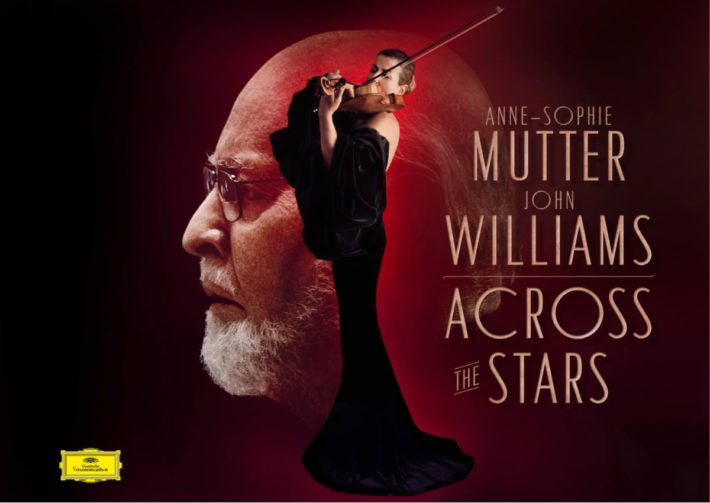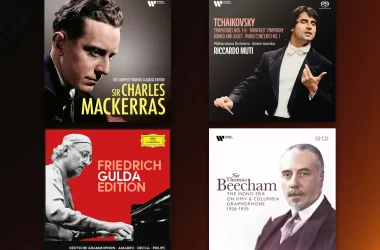“Across the Stars” stems from the collaboration of two musical celebrities, violinist Anne-Sophie Mutter and film composer John Williams. The exact origins of the collaboration are unclear (Williams writes that Mutter is “not someone you say no to”) but what has finally emerged is a set of short concert pieces for solo violin and orchestra, all arrangements of Williams’ film music. The album is passionately constructed and fun to listen to. To be cynical for a moment, this can be seen as a set of novelties that lacks a coherent emotional arc. But on balance, it’s an exciting anthology of William’s musical themes, infused with new colors and recorded by the best of the best. The cynical element disappears when one considers the tracks in smaller parts, so this review will give each part its due separately.

The album opens with three tracks that essentially comprise a concertino — two Star Wars themes, Rey and Yoda, and the iconic “Hedwig’s Theme” from Harry Potter. In Rey’s theme, Mutter is immediately tasked with soloistic challenges that Williams has clearly enjoyed dreaming up: imitating the earthy sound of the flute’s low register for the opening “showdown” motif; multi-octave arpeggios and double-stops with trills on one of the strings; then imitating horn calls in thirds. Mutter effortlessly switches between colors and techniques, and the movement is one of the catchiest on the album. If you squint, it makes a great sonata-form. The concertino’s slow movement would be the Yoda theme, whose lyric melody (from Strauss) and contrasting woodwind section (from Tchaikovsky) together make an effective andante cantabile.
Unfortunately, the arrangement in this movement is less adept than on most others. Williams transposes the theme from C to G, most likely to let Mutter use her low G string and play the theme in the octave it was written; yet she starts in the violin’s second octave and rises to its third, never playing the theme in the tenor range, where it is most transcendent. The underlying accompaniment has also shifted from steady quarters and eighth notes to tremolo and off-beats, depriving Yoda of some of his stateliness. Still, the movement works as a Romantic interlude.
The finale is indeed “Harry Potter meets Paganini,” as the pair describe it, with Williams again gleefully challenging Mutter to sextuplet runs, pizzicato arpeggios, an extended, fully-diminished cadenza, and a finale, again after Tchaikovsky. The result approaches theme and variations, in which case a harmonics-based variation would have been nice, to take full advantage of the violin’s potential. Nonetheless, after the final chord, this listener did have to pause for a breath, and to acknowledge the awesomeness of a Star Wars and Harry Potter concerto.
“Across the Stars,” the love theme for Anakin and Padmé and probably the most iconic Star Wars theme on the album, loses some of its emotional power as a solo. The tension between the threat of the impending war and the depth of the duo’s romance, embodied in the soundtrack by foreboding low brass against full-throated tutti renditions of the love motif, disappears to allow Mutter more soloistic discretion in the love sections; the war motif is downgraded to the role of transitional material.
The middle section of the album is quite enjoyable, with three upbeat numbers that show both Williams and Mutter at their best. The “Recording Arts Orchestra of Los Angeles” is also at its best on these tracks. “Donnybrook Fair” (from “Far and Away”) is a fun romp through the English Isles that proves Williams can write tutti moments without upstaging the soloist. The orchestra provides color changes on a dime and woodwind solos with the right touches of sarcasm. Despite a challenging violin part, Mutter’s sense of humor comes through as well, with exaggerated gestures and articulation and teasing chromatic lines. This is her and Williams’ virtuosity on full display — it takes a strong composer to write music that is at once powerful and playful, and a technical expert to perform it.
“Night Journeys” (from “Dracula”) is a tense showpiece that borrows ideas from Shostakovich and lets Mutter show her dramatic side. The orchestra also sounds great on this track, but the music is better suited to a full symphonic concert hall, and the recording compresses its range of colors. In “The Duel” (“The Adventures of Tintin”), Mutter parries back and forth with the orchestra, trading glissando swipes with the celli, and playing her part as if twirling her sword to intimidate her adversary. She also handles 32nd-note runs with stunningly precise bow bounces, as if to demonstrate her superior agility. The cadenza lacks a real show-stopping moment, but the track is nonetheless superb.
The album closes with the main theme from “Schindler’s List,” which was scored for violin and orchestra to begin with. It is a fitting closer, emotional and cathartic, but there are better recordings of it available, either on the soundtrack itself with soloist Itzhak Perlman, or Renaud Capuçon’s rendition with the Brussels Philharmonic. Mutter’s playing is a bit overwrought; each note often inhabits a totally different world than the previous one, with different speeds or colors of vibrato, or seemingly randomly-placed glissandi. The overall effect makes the melody lose the smooth, legato quality that makes it so haunting in the other versions.
This album will surely appeal to fans of Williams’ music, especially those who can picture the movies in their mind while the music plays. To have new versions of old standards is always a treat. To classical fans, and followers of Mutter, it may have slightly less to offer, but few of the more exciting tracks will sneak into their rotation of frequently played pieces. Recommended listening for sure.
“Across the Stars”
Film music by John Williams, arranged for violin and orchestra.
Anne-Sophie Mutter – Violin
The Recording Arts Orchestra of Los Angeles
John Williams – Conductor
Deutsche Grammophon, CD 028948374564




















